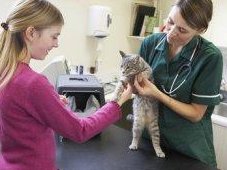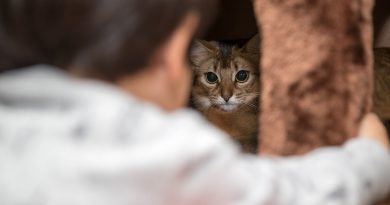Vaccinations for Cats

Kittens receive some natural protection from there mother. As this declines, the kitten becomes more susceptible and so it is important to see your vet when the kitten is just a few weeks old. It should also be noted that mothers will only pass on this protection if they themselves have been properly vaccinated. Precautions such as not allowing your kitten to leave the garden should be taken.
Your kitten will probably be vaccinated after 9 weeks and then again 12 weeks after birth depending on the vaccinations used. Since proper protection may take about 2 weeks to come into force, it is wise to continue to keep the kitten away from other cats.
While these vaccinations offer good protection, it is important that your cat receives regular booster injections on a yearly basis. You will be given a certificate of vaccination which you will be asked to show when putting your cat into a cattery.
Diseases Your Cat Should be Vaccinated Against:
Feline Infectious Enteritis (Panleucopania)
This is highly contagious and spreads very rapidly, and can remain in the environment for very long period of time. The severity of this disease can range from a mild fever through to death. Cats who survive this disease may have damaged immune systems and so are susceptible to other infectious diseases. Symptoms: tiredness, depression, lack of appetite, abdominal pain, vomiting, and extreme diarrhea, leading to severe dehydration.
Feline Infectious Respiratory Disease (Cat Flu)
This rarely causes death in healthy adults but the lives of young, ill or old cats can be threatened by this. The two viruses associated with this disease are spread by sneezing. Recovered cats may carry this disease for several years, infecting other cats along the way. When the ‘carrier’ cat is under unnecessary stress (such as a newcomer to the home) can lead to recurrence of the symptoms. Symptoms: running eyes and nose, sneezing, high temperature, mouth ulcers and occasional pneumonia.
Feline Chlamydia
This disease is also spread by the respiratory system. The characteristic symptom of Chlamydia is discharge from the eye, quickly spreading to the other eye. These symptoms can last for years when left untreated. The cat will continue to eat as normal and will probably have a normal temperature. Chlamydia can also infect the genitals of cats, leading to reproductive failure. Symptoms: red eyes with a thick discharge, mild nasal discharge and occasional sneeze.
Feline Leukemia
This can damage the immune system of cause tumors. It has been thought that almost 2/3 of cats will come into contact with another infected with the disease at some point in their lives. The disease spreads via any bodily fluid and is commonly transmitted by fighting, grooming or sexual activity. Infected cats must not be allowed to have kittens since they will be born with the disease. Indeed, there are many similarities with the Human Immunodeficiency Virus (HIV) but rest assured that Feline Leukemia is not transmissible to humans. The disease can become fatal since the cat’s damaged immune system cannot fight the attack of other, perhaps usually fairly harmless, infectious agents. The infected cat may appear slow to recover from these common ailments and may display a recurrence of infection of such diseases. Another sign of infection is anemia which manifests itself as pale gums and listlessness.
A blood or saliva test will tell you if your cat is infected. If you are worried that it is, and it turns out that your cat is free of infection, consider this to be your lucky day and insist on having your cat vaccinated against the disease immediately.



